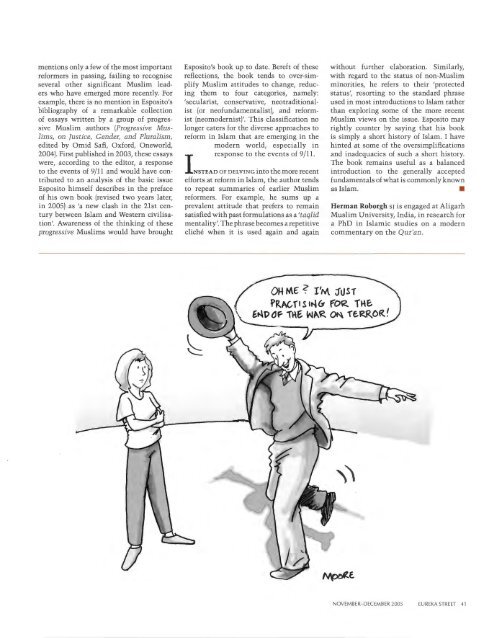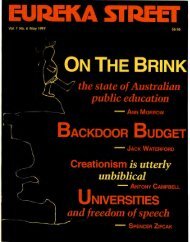0 - Eureka Street
0 - Eureka Street
0 - Eureka Street
You also want an ePaper? Increase the reach of your titles
YUMPU automatically turns print PDFs into web optimized ePapers that Google loves.
mentions only a few of the most important<br />
reformers in passing, failing to recognise<br />
several other significant Muslim leaders<br />
who have emerged more recently. For<br />
example, there is no mention in Esposito's<br />
bibliography of a remarkable collection<br />
of essays written by a group of progressive<br />
Muslim authors (Progressive Muslims,<br />
on Ju stice, Gender, and Pluralism ,<br />
edited by Omid Safi, Oxford, Oneworld,<br />
2004). First published in 2003, these essays<br />
were, according to the editor, a response<br />
to the events of 9/ 11 and would have contributed<br />
to an analysis of the basic issue<br />
Esposito himself describes in the preface<br />
of his own book (revised two years later,<br />
in 2005) as 'a new clash in the 21st century<br />
between Islam and Western civilisation'.<br />
Awareness of the thinking of these<br />
progressive Muslims would have brought<br />
Esposito's book up to date. Bereft of these<br />
reflections, the book tends to over-simplify<br />
Muslim attitudes to change, reducing<br />
them to four categories, namely:<br />
'secularist, conservative, neotraditionalist<br />
(or neofundamentalist), and reformist<br />
(neomodernist)'. This classification no<br />
longer caters for the diverse approaches to<br />
reform in Islam that are emerging in the<br />
modern world, especially in<br />
response to the events of 9/ 11.<br />
I N STEAD OF DELVING into the 1nore recent<br />
efforts at reform in Islam, the author tends<br />
to repeat summaries of earlier Muslim<br />
reformers. For example, he sums up a<br />
prevalent attitude that prefers to remain<br />
satisfied with past formulations as a 'taqlid<br />
mentality'. The phrase becomes a repetitive<br />
cliche when it is used again and again<br />
without further elaboration. Similarly,<br />
with regard to the status of non-Muslim<br />
minorities, he refers to their 'protected<br />
status', resorting to the standard phrase<br />
used in most introductions to Islam rather<br />
than exploring some of the more recent<br />
Muslim views on the issue. Esposito may<br />
rightly counter by saying that his book<br />
is simply a short history of Islam. I have<br />
hinted at some of the oversimplifications<br />
and inadequacies of such a short history.<br />
The book remains useful as a balanced<br />
introduction to the generally accepted<br />
fundamentals of what is commonly known<br />
as Islam.<br />
•<br />
Herman Roborgh ST is engaged at Aligarh<br />
Muslim University, India, in research for<br />
a PhD in Islamic studies on a modern<br />
commentary on the Qur'an.<br />
NOVEMBER- DECEMBER 2005 EURE KA STREET 41
















